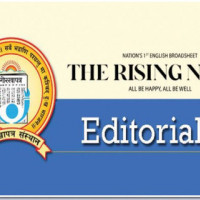- Thursday, 21 November 2024
Nepal's Voice At COP 29
Nepal has strongly voiced its climate concerns at the UN climate conference being held in Baku of Azerbaijan as the nation is forced to bear the untold burden of natural disasters, lost livelihoods, emerging health problems, depleting water sources and unpredictable weather phenomena. Delivering his keynote address at the 29th Conference of the Parties to the United Nations Framework Convention on Climate Change (COP 29), President Ramchandra Paudel raised the paramount issues of climate justice, climate financing and the redressal of the loss and damage caused by climate change impacts. Occurrence of devastating rain-induced disasters over the years have brought significant damage and losses to Nepal's physical infrastructures, people's lives and properties. These calamitous events have been attributed to rising temperatures and unusual shifts in weather patterns.
In 2021, devastating floods in Melamchi River in Sindhupalchowk district caused big damage to the nation's priority project that supplies water to the capital valley in addition to losses of lives and properties. A recent glacial lake outburst flood in the Khumbu region devastated settlements, farmlands and other properties at Thame. The latest extreme rain disaster that occurred just before the retreat of this year's monsoon caused heavy losses of lives and properties in the Kathmandu Valley and its vicinity. Cloudbursts and downpours of the scale never seen and experienced before have broken the patterns of monsoon dynamism and rainfall which scientists blame to climate change. Now the focus is on adaptation measures to stay safe from climate impacts and availing compensation to the least developed and vulnerable countries who are least responsible in the making of the climate crisis.
Climate change has affected the whole planet, but its impacts have been especially severe in poor, least developed and developing nations, President Paudel said in his address. We have increased forest cover and enhanced production and supply of clean energy to mention a few of our efforts, the President said while highlighting the climate actions being taken on Nepal's part but added that the challenges triggered by global warming and climate change far exceed our capacity and resources to manage them. Excessive emissions of greenhouse gases is the chief reason for global rise of temperatures which trigger inhospitable consequences of climate change. But the role of least developed countries like Nepal have very negligible contribution in the greenhouse gas emissions. And we are bearing the brunt of the adverse impacts in the sectors like health, agriculture, ecosystem, bio-diversity and livelihoods.
The grievances of climate impacts faced by the resource-strapped least developed countries must be addressed through global loss and damage fund. The 'polluters pay' principle of climate justice must be applied in the creation and utilisation of the international fund to which the developed and industrialised nations should make contributions. President Paudel said that the climate financing mechanism should recognise the contributions of the countries like Nepal in protecting bio-diversity, the Himalayan cryosphere as well as in supplying fresh water. Nepal has large green cover which plays a role in absorbing greenhouse gases known as carbon sequestration.
In a very positive development during the Baku climate conference, an agreement has been signed between the Global Environment Facility (GEF) and Nepal's Ministry of Forest and Environment for the implementation of two major climate resilience projects. The project deals with Marin watershed conservation and utilisation in Sindhuli district and capacity building initiative for transparent reporting regarding Nepal's international climate commitments. The US$ 10.5 million projects will be implemented in two to five years.









-original-thumb.jpg)






